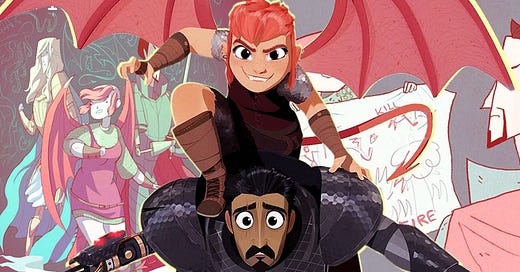As you may have seen plastered all over LA, Nimona has been nominated for an academy award for Best Animated Feature this year. There’s pretty hefty competition in that department, but whatever may come, this will definitely be a tricky one to judge.
The animation style is smooth as butter, the voice acting is superb, the eye and face acting from the characters is absolutely phenomenal. They say as much in as little words but with their visuals, which is perfect in this medium. And like film in general, but that’s a long-standing problem in this industry that we’ll face maybe never.
Nimona began as Stevenson’s thesis at the Maryland Institute College of Art and it eventually became a popular webcomic that HarperCollins picked up in 2015. 20th Century Fox acquired the rights for an animated adaptation, but after Disney ate Fox in 2019, Nimona was delayed indefinitely until it was completely killed when Blue Sky Studios was shut down and the pandemic stalled most of the industry.
Annapurna Pictures bought the rights for a Netflix release and we saw the fruits of their labor just last year with a queer romance front and center, but definitely secondary to the story and the identity themes.
Disney must be hurting because none of their slotted movies in 2023 are for consideration in the animation department and here Nimona comes, to remind them of what they could have been.
Did the queer romance make Disney executives uncomfortable? Probably.
A gay couple kissing on scene in an animated movie. Iconic but poorly received from initial conception to even release.
That and the adult themes. Not like gore or excessive violence. But in sexuality, gender identity, morality, love, institutional racism. This movie picks at the Institution of society and asks some hard-hitting questions.
We see how history is written by the ones who win. By the folks who are universally applauded and accepted and how their narrative diminishes others. This may be their truth, but it is not the only truth.
And we get fantastic, fabulous, flawed Nimona. A genderfluid gender-nonconforming teen hellbent on causing chaos wherever they go. Their existence is already two steps and a skip away from what is considered a “normal protagonist,” but it is the way they lean into this identity and how it shapes their entire existence that elevates this movie.
Everyone’s identity and intentions are called into question and examined, but it is done in a tasteful enough way that it doesn’t feel performative or shoved-down-your-throat. These aspects of their identity are important because it turns them into complex characters. The layers to unpack, man. Great stuff.
At the end of the day, this was a little predictable overall narratively, but the way this film develops the pseudo father-daughter relationship between Ballister Boldheart (Riz Ahmed) and Nimona (Chloë Grace Moretz) through banter and silly encounters is lovely.
The underlying romance between Ballister and Ambrosius (Eugene Lee Yang) is gentle and informs their actions, but does not take away from the overall drama of deceit and misplaced trust.
Their relationship is such a lovely representation of queer love that is healthy and wholesome (beyond the whole arm-chopping accident, but we can move past that). It’s not toxic or hypersexualized— it just exists. And I love that for the community. In every way, this movie was meant to fail, by the executives up top, down to the timing and its perpetually-pushed-back release date.
The fact that this exists is a massive testament to the creative work and the fact that it is time for LGBTQ+ love stories to be front and center. It’s not weird or strange or out of the norm.
This is normal. This is fine.
This is love.
And that is fine.





